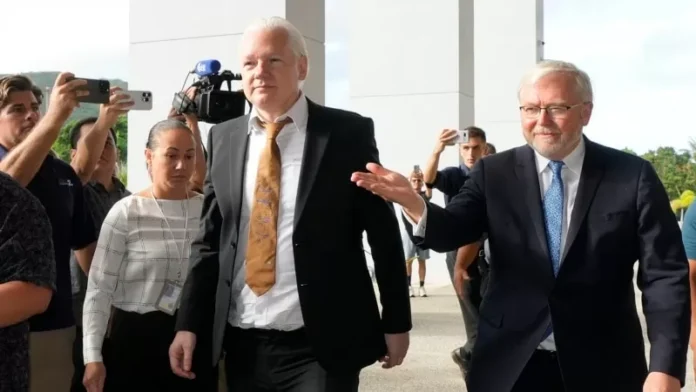SAIPAN, Northern Mariana Islands – After years of legal battles, WikiLeaks founder Julian Assange has finally reached a plea deal with the U.S. Justice Department that secures his freedom and brings an end to a divisive legal saga. The deal was entered in federal court in Saipan, the capital of the Northern Mariana Islands, a U.S. commonwealth in the Pacific, on Wednesday morning. Assange, who arrived at court shortly before the hearing, did not take any questions.
Under the terms of the deal, Assange will plead guilty to a single felony charge for publishing U.S. military secrets, but he will be able to return to his native Australia without serving any time in an American prison. This marks a significant victory for both sides, with the Justice Department able to resolve the case without going to trial and Assange able to avoid a lengthy prison sentence.
The announcement of the deal was met with applause from WikiLeaks, the secret-spilling website founded by Assange in 2006. They expressed gratitude to all those who stood by them and fought for Assange’s freedom.
The U.S. Justice Department agreed to hold the hearing on the remote island of Saipan because Assange opposed coming to the continental U.S. and because it is near Australia, where he will return. This decision allows both sides to reach a resolution without the burden of extradition proceedings that could have dragged on for years.
The guilty plea brings an end to a criminal case brought by the Trump administration in connection with the publication of war logs and diplomatic cables that revealed U.S. military misconduct in Iraq and Afghanistan. The government alleged that Assange conspired with former Army intelligence analyst Chelsea Manning to obtain and publish these documents, putting American national security at risk by revealing the names of human sources.
However, Assange’s actions also garnered support from press freedom advocates who commended his role in exposing military conduct that may have otherwise remained hidden. One of the most significant leaks was a video of a 2007 Apache helicopter attack by American forces in Baghdad that resulted in the deaths of 11 people, including two Reuters journalists.
While this indictment was unsealed in 2019, Assange’s legal troubles began long before and continued even after the criminal case. In 2010, a Swedish prosecutor issued an arrest warrant for him based on allegations of rape and molestation. However, these charges were later dropped and Assange maintained his innocence.
In 2012, he sought asylum at the Ecuadorian Embassy in London, claiming political persecution. He spent the next seven years in self-exile, making occasional appearances from the embassy’s balcony and receiving visits from celebrities and supporters.
In 2019, his asylum was revoked, and he was arrested by British police. He has been in custody for the past five years as the U.S. sought to extradite him, facing skepticism from British judges who were concerned about his treatment in the American criminal justice system.
However, the resolution of this case, which spares Assange from serving time in a U.S. prison, is a clear rejection of the years of warnings from Assange and his supporters about the harsh treatment he would face in the American criminal justice system. It should be noted that prosecutors never sought the death penalty, despite claims from Assange and his team.
With this plea deal, Assange can finally put an end to his legal battles and return to his home country of Australia. It also brings an end to a complicated and contentious legal saga that raised questions about press freedom and national security. Let this serve as a reminder that the pursuit of truth and transparency should not be hindered, and the rights of journalists to hold those in power accountable should be protected.

